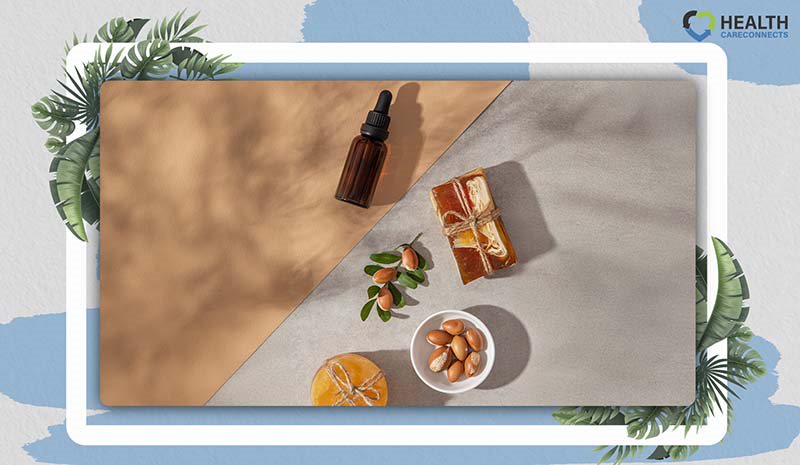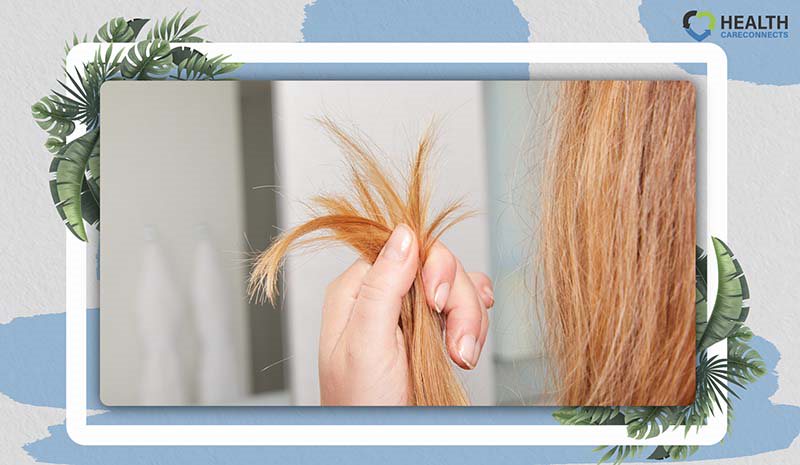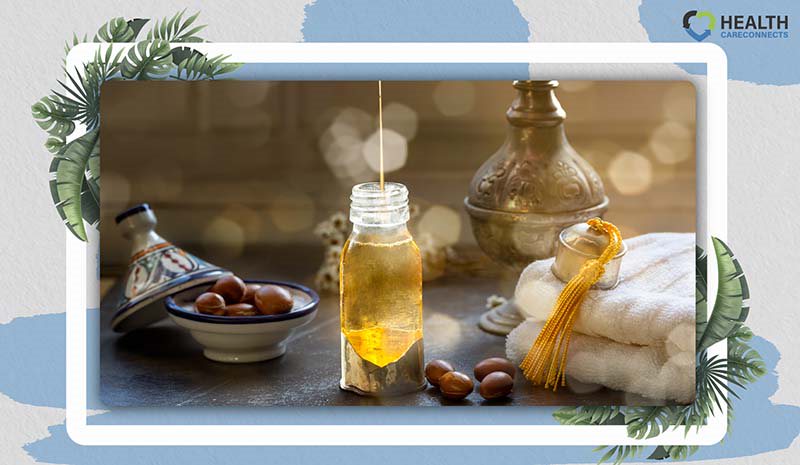“Does argan oil grow hair?” Argan oil is integral to Moroccan culture and has been cherished for centuries. This precious oil is derived from the kernels of the argan tree, native to southwestern Morocco, and is celebrated for its culinary and cosmetic virtues.
Rich in essential nutrients such as fatty acids, antioxidants, vitamin E, and squalene, argan oil provides substantial nourishment to the skin, hair, and nails. It’s especially revered for its ability to enhance hair strength and impart a radiant shine, contributing to healthier hair growth and improved texture. Discover how argan oil can be your powerful assistant in achieving shiny, strong, and healthy hair.
Does Argan Oil Grow Hair?
Argan oil is rich in essential fatty acids, including oleic, linoleic, and palmitic acids. These nutrients are crucial for nourishing the hair and scalp, stimulating blood circulation to the hair follicles, and preventing hair loss. By improving scalp health and providing essential nutrients, argan oil can contribute to healthier hair growth.
Additionally, argan oil is abundant in vitamin E, an antioxidant that protects the hair from damage caused by free radicals. This protection helps maintain the hair’s strength and reduces breakage.
Argan oil also contains plant sterols, which can reduce inflammation and irritation of the scalp. This is particularly beneficial for individuals with skin conditions like psoriasis or eczema, as it helps soothe the scalp and promote a healthier environment for hair growth.

Three Benefits of Using Argan Oil for Your Hair
Argan oil is packed with fatty acids and powerful antioxidants like vitamin E, which have proven benefits for your scalp and hair. Here are three key advantages of using argan oil to protect and support healthy hair:
Argan Oil Reduces Scalp Dryness
Argan oil is renowned for its moisturizing properties. It can soothe the scalp, reduce flakiness, and alleviate dryness, making it an excellent choice for those suffering from dry and itchy scalp conditions.
Argan Oil Fights Frizz
Rich in fatty acids and vitamin E, argan oil helps to smooth the hair cuticle, taming frizz and flyaways. It adds shine and smoothness to the hair, making it easier to style and manage.
Argan Oil Helps Prevent Split Ends
By improving hair elasticity and providing essential moisture, argan oil can help prevent split ends. Regular application of argan oil to the hair tips can reduce breakage and keep the ends smooth and healthy.

Daily Use of Argan Oil for Your Hair: Is It Recommended?
Using argan oil on your hair every day is possible, but there are some considerations to keep in mind, especially if you have thin hair. Start with a small amount and gradually add more if needed. Using too much can make your hair look limp and greasy. Opt for a lightweight argan oil to avoid weighing down your hair.
If you notice your hair looking oily between washes after starting to use argan oil, try applying it only to freshly-washed hair or experiment with using smaller amounts. This approach can help maintain the benefits of argan oil without making your hair appear oily.
Incorporating Argan Oil into Your Haircare Routine
If you’re ready to enjoy the benefits of argan oil for your hair, there are several ways to incorporate it into your haircare routine:
Argan Oil Hair Mask
Creating your own argan oil mask is simple. Using pure argan oil will maximize benefits, and you can use it alone or mix it with other nourishing oils like coconut oil or castor oil.
How to make and use:
- Massage 8 to 10 drops of argan oil into your hair and scalp using your hands. Adjust the amount based on your hair length.
- Continue massaging for 10 minutes, ensuring full coverage from roots to ends.
- Wrap your hair in a towel or hair wrap and leave it on overnight.
- Wash your hair in the morning and style as usual.
Argan Oil Shampoo
You can buy argan oil shampoo or easily make your own.
How to make and use:
- Pour your usual amount of shampoo into your palm.
- Add one or two drops of argan oil to the shampoo and mix by rubbing your hands together.
- Apply to your hair, wash, and rinse as usual.
- Repeat every two or three days.
Leave-in Conditioner
Skip your regular conditioner and use argan oil as a leave-in conditioner to reduce breakage from combing and styling.
How to use:
- Wash your hair thoroughly according to the shampoo bottle’s directions.
- Towel-dry your hair so it’s damp, not dripping.
- Rub two or three drops of argan oil in your hands and apply to your hair.
- Dry and style your hair as usual.
- Do this once or twice a week.
Styling Product
Use argan oil as a styling product to smooth your hair and reduce frizz. It also offers protection from heat styling.
How to use:
- Squeeze one or two drops of argan oil into your palm and rub your hands together.
- Lightly apply to clean, dry hair without massaging into the scalp — you want a light coating on the hair’s surface.
- Style as usual.

Potential Hair Benefits of Argan Oil
Argan oil is celebrated for its numerous benefits for hair health due to its rich nutrient profile. Here are some potential benefits of using argan oil on your hair:
- Fatty Acids in Argan Oil: Argan oil contains essential fatty acids, primarily linoleic and oleic acids, which are intensely hydrating. These fatty acids help keep hair moisturized and protect it from damage caused by free radicals.
- Vitamin E and Antioxidants: The abundance of vitamin E and other antioxidants in argan oil helps prevent dryness of the scalp and hair, reduces frizziness, and plays a role in preventing breakage. These antioxidants protect the hair from environmental damage and oxidative stress.
- Anti-inflammatory Properties: Inflammation can negatively impact hair follicles and overall scalp health. The high antioxidant levels in argan oil may help prevent or improve scalp conditions that can cause hair loss, such as seborrheic dermatitis and psoriasis. By reducing inflammation, argan oil promotes a healthier scalp environment conducive to hair growth.
- Protection from Sun Damage: The antioxidant effect of argan oil can protect hair from harmful UV rays, preventing damage and dryness to the hair and shaft. Regular use of argan oil can help maintain the hair’s natural shine and strength even after sun exposure.
- Protection Against Styling Damage: Over-styling, including the use of dryers, perms, colors, and styling products, is a common cause of hair damage and loss. The rich oils and antioxidants in argan oil add a protective and nourishing layer to hair damaged by processing and styling. It helps to strengthen hair that has been weakened by chemical treatments, reducing breakage and promoting healthier hair.
Safety of Argan Oil for Your Hair
Argan oil is widely regarded as safe for use on hair and is a natural substance extracted from the kernels of the argan tree. Its nourishing properties make it a popular ingredient in many hair care formulations. Suitable for all hair types, including colored or chemically treated hair, argan oil should be used sparingly on very fine or oily hair to prevent a greasy appearance.
The benefits of argan oil are best achieved by using a high-quality, pure oil. Checking the ingredient list for purity ensures that the product does not contain additional oils or substances that may alter its effectiveness. When applied in moderation, argan oil can enhance hair health, making it a valuable addition to your hair care routine.
Conclusion
In conclusion, the question “Does argan oil grow hair?” then we can see that argan oil is highly effective in moisturizing your hair and scalp, protecting your hair from everyday damage. By reducing breakage and split ends and maintaining a healthy scalp, argan oil may help prevent hair loss, leading to thicker, fuller hair.
This suggests that argan oil does indeed promote hair growth. Incorporating argan oil into your hair care routine can provide long-lasting benefits and enhance the overall health and appearance of your hair.
For those seeking more information and honest product reviews, I recommend visiting HealthCareConnect. Explore firsthand experiences from users and gain valuable insights to help inform your decision.

Dr. Joyce Slater: Your Guide to Informed Health Choices
Dr. Joyce Slater shines as a distinguished expert in the field of nutrition and public health. Contributing her vast expertise to HealthConnectbc, she embodies a deep-seated passion for enhancing public well-being. As a respected figure in her field. Dr. Slater’s academic journey and professional achievements are nothing short of inspirational.
Holding a significant position as a researcher and educator, Dr. Slater has delved deeply into the intricacies of food literacy and nutritional science. Her work, prominently featured in numerous esteemed scientific publications, underscores her dedication to expanding our understanding of food’s role in health and society.
At the heart of Dr. Slater’s professional ethos is a profound desire to positively impact individual lives through education and research. She often says, “Empowering people with the knowledge to make healthier choices is the most rewarding aspect of my work.” This principle is the cornerstone of her involvement with HealthConnectbc, where she strives to provide reliable and practical health advice.
Dr. Slater’s contributions to HealthConnectbc are multifaceted: academically, she offers insights into the complex world of nutrition and health, enhancing both public understanding and professional practices. Additionally, she is instrumental in guiding and inspiring the next generation of health professionals, thus fostering future excellence in the field.
Juggling rigorous research with her educational duties, Dr. Slater demonstrates an unwavering commitment to her profession. Her approachable nature and genuine concern transcend the confines of academia, touching the lives of everyone she interacts with. Dr. Slater looks forward to continuing her journey of discovery and education, dedicated to the ongoing improvement of public health and nutrition.
At HealthConnectbc, Dr. J. Slater is not just a contributor; she is a guiding light, dedicated to enlightening and motivating individuals towards a healthier and more informed lifestyle.
PUBLISHED ARTICLES
- Food literacy competencies: A conceptual framework for youth transitioning to adulthood (2018)
- Self-perceived eating habits and food skills of Canadians (2016)
- Challenges to acquiring and utilizing food literacy: Perceptions of young Canadian adults (2016)
- Socio-demographic and geographic analysis of overweight and obesity in Canadian adults (2009)
- Sustainable well-being: Concepts, issues, and educational practices (2014)

